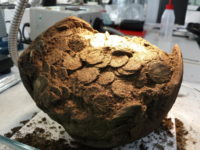 A hoard of 1,608 coins Roman coins discovered by metal detectorists in a field it Boldre, in the New Forest near Lymington, Hampshire, in 2014, has gone on public display for the first time at the St Barbe Museum and Art Gallery in Lymington. The hoard dates to the 3rd century A.D. and contains bronze radiates from the second half of the 3rd century. The earliest coin in the group was minted under the reign of Trebonianus Gallus (249-51 A.D.). The most recent is barely 25 years older, struck in 276 in the waning days of the emperor Tacitus (275-6 A.D.). The bulk of the coins were found in the remains of a round vessel, 15 sherds from the bottom of the earthenware pot.
A hoard of 1,608 coins Roman coins discovered by metal detectorists in a field it Boldre, in the New Forest near Lymington, Hampshire, in 2014, has gone on public display for the first time at the St Barbe Museum and Art Gallery in Lymington. The hoard dates to the 3rd century A.D. and contains bronze radiates from the second half of the 3rd century. The earliest coin in the group was minted under the reign of Trebonianus Gallus (249-51 A.D.). The most recent is barely 25 years older, struck in 276 in the waning days of the emperor Tacitus (275-6 A.D.). The bulk of the coins were found in the remains of a round vessel, 15 sherds from the bottom of the earthenware pot.
After slumbering underground for more than 1,700 years since its owner buried his savings, disturbed only by the farm equipment that likely broke the pot, the hoard has seen quite a bit of drama starting with the moment of its discovery. There were several metal detectorists scanning that field in Boldre on May 4th, 2014, among them two old friends Andy Aartsen and James Petts. Aartsen made the first discovery: 25-30 coins on their own. Then Petts hit the motherlode, finding the remains of the pot and its coin hoard of more than 1,500 pieces.
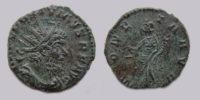 Aartsen had scanned that area earlier and gotten a signal but had moved on. According to the rules of the metal detecting club, if you walk away from a signal it counts as abandonment and the next guy gets to pick up where you left off, but Aartsen apparently thought his earlier signal granted him perpetual rights because he told Petts “Eff off, it’s mine.” That’s a quote from James Petts’ testimony at the coroner’s inquest that determined whether the coin hoard was official treasure by the standards of the Treasure Act of 1996, which is downright spicy compared to the usual testimony from British Museum and Portable Antiquities Scheme experts one encounters at treasure inquests.
Aartsen had scanned that area earlier and gotten a signal but had moved on. According to the rules of the metal detecting club, if you walk away from a signal it counts as abandonment and the next guy gets to pick up where you left off, but Aartsen apparently thought his earlier signal granted him perpetual rights because he told Petts “Eff off, it’s mine.” That’s a quote from James Petts’ testimony at the coroner’s inquest that determined whether the coin hoard was official treasure by the standards of the Treasure Act of 1996, which is downright spicy compared to the usual testimony from British Museum and Portable Antiquities Scheme experts one encounters at treasure inquests.
The conflict caused a permanent rift between the former friends, and it really wasn’t about the money because bronze radiates aren’t big ticket items. The amount of the valuation that would be paid by the museum that acquired the hoard was around £8,000 to be split 50/50 by the finder and landowner. This fight was all about credit, who gets to be the official finder of the Boldre Hoard. Andy Aartsen wanted to be declared the sole finder; Petts wanted it declared a joint find of both men, which seems more than fair given that he found the vast majority of the hoard and the container. At the time of the inquest, the dispute was still ongoing and Central Hampshire Coroner Grahame Short suggested the two ex-friends might have to duke it out in court if they couldn’t come to an agreement. I couldn’t discover what the disposition their dispute was, but the articles about the new exhibition refer only to James Petts as the finder.
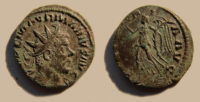 The British Museum seemed interested in acquiring the rarest of the coins — three coins struck under the rule of Marius who reigned for exactly 12 weeks in 269 A.D. — but that would have broken up the hoard. The St Barbe Museum and Art Gallery wanted to keep every coin and the pot together and put them on display a few miles away from where they were discovered and that was going to require some fast fundraising.
The British Museum seemed interested in acquiring the rarest of the coins — three coins struck under the rule of Marius who reigned for exactly 12 weeks in 269 A.D. — but that would have broken up the hoard. The St Barbe Museum and Art Gallery wanted to keep every coin and the pot together and put them on display a few miles away from where they were discovered and that was going to require some fast fundraising.
Rosalyn Goulding, of the museum, said the coins were an “exciting” find for the town.
“We haven’t had too much evidence of Roman activity here but this find helps us to build up a picture of settlement and agriculture,” she said.
“One of the coins is really interesting because it has an unrecorded reverse.
“The emperors would strike a series of coins and they each had a pattern to them – they would have similar things on the front and on the reverse – but this one had an altar on the back which has never before been seen on a Divus Victorious coin, or any coins issued by Victorious.”
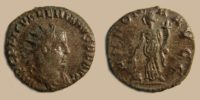 Historian and television presenter Dan Snow who lives in the area launched the fundraising campaign last fall with a target of £30,000 ($40,000). Donations large and small came from private individuals, local businesses, organizations and grants from charitable trusts. When the January 31st deadline arrived, the campaign was just short of its target at £27,842.20. One of the donors, American Anglophile Richard Beleson, bumped up his already generous donation of £7,500 in matching funds to cover the shortfall.
Historian and television presenter Dan Snow who lives in the area launched the fundraising campaign last fall with a target of £30,000 ($40,000). Donations large and small came from private individuals, local businesses, organizations and grants from charitable trusts. When the January 31st deadline arrived, the campaign was just short of its target at £27,842.20. One of the donors, American Anglophile Richard Beleson, bumped up his already generous donation of £7,500 in matching funds to cover the shortfall.
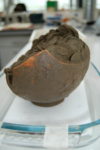 Most of that money was not needed for the acquisition of the hoard itself, which was modestly valued. It was to be spent on conservation of the hoard, necessary restoration of the space and to build a secure display case which will preserve the coins and pot in controlled conditions. The hoard’s needs fit seemlessly with the museum’s. A month before the fundraiser was launched, the St Barbe Museum and Art Gallery began an extensive refurbishment paid for by a £1.78 million grant from the Heritage Lottery Fund. The galleries were enlarged, the entrance improved and a new cafe was built. All together, this was a major upgrade for the small local museum, making it a fitting home for the Boldre Hoard and the extra eyeballs it is sure to draw. (Everybody loves a hoard, especially when it’s a local kid made good.)
Most of that money was not needed for the acquisition of the hoard itself, which was modestly valued. It was to be spent on conservation of the hoard, necessary restoration of the space and to build a secure display case which will preserve the coins and pot in controlled conditions. The hoard’s needs fit seemlessly with the museum’s. A month before the fundraiser was launched, the St Barbe Museum and Art Gallery began an extensive refurbishment paid for by a £1.78 million grant from the Heritage Lottery Fund. The galleries were enlarged, the entrance improved and a new cafe was built. All together, this was a major upgrade for the small local museum, making it a fitting home for the Boldre Hoard and the extra eyeballs it is sure to draw. (Everybody loves a hoard, especially when it’s a local kid made good.)
The refurbished museum had its grand reopening on Saturday with the Boldre Hoard as its centerpiece and signature treasure. Lord Montagu of Beaulieu did the honors, officially opening the inauguration day festivities.
I lived in Lymington for a few months. We’ve taken holidays there since. I recommend the area warmly: the New Forest is a lovely spot.
———–
“Once upon a time there was a little girl whose father and mother had died, … [] … and there came yet another child, and asked for a shift: ‘You can very well give your shift away,’ and she took it off, and gave it away as well. And thus she stood there, with nothing left at all, when suddenly some stars fell down from heaven, and they were nothing else but hard shining Romano-British coins, and although she had just given her shift away, she was now wearing a new one which was of the very finest linen. Then she gathered together all those Roman coins into it, and was rich all the days of her life […and never mind the pot!].”
———–
:hattip:
PS: Dearie, I assume that Lymington is indeed not bad at all (as the North is probably too)
Please don’t take this as mining this gem of a blog for faults, but wasn’t Decius, slain by the Goths, the Emperor who reigned 249-251?
Yes, and “276AD” is seemingly more than 25 years younger than 250AD 😉
Emperor Philippus Arabs (‘the Arab’) was replaced by Decius in 249AD, who himself, i.e. in 251AD already, fell victim to Sarmato-Gothic invasions of 250-270 into the Roman empire in the -now Romanian- Danube region. Between 258 and 260AD, however, Shapur I of Persia captured Emperor Valerian after wiping out his army at the Battle of Edessa. A bit later, on his way back to the west to deal with Frankish and Alamannic invasions into Gaul, Emperor Tacitus died in Cappadocia/ Anatolia in 276AD.
Apparently, the whole thing continued for yet another 200 years.
==========================
————————————
As Zosimus, in his ἱστορία νέα (ca. 500AD) reports in Book1:
————————————
“The ‘Scythians’, taking advantage of the disorder which every where prevailed through the negligence of Philip, crossed the Tanais, and pillaged the countries in the vicinity of Thrace. But Decius, marching against them, was not only victorious in every battle, but recovered the spoils they had taken, and endeavoured to cut off their retreat to their own country, intending to destroy them all. […] For this purpose he posted Gallus on the bank of the Tanais with a competent force, and led in person the remainder of his army against the enemy. This expedition exceeded to his utmost wish ; but Gallus, who was disposed to innovation, sent agents to the Barbarians, requesting their concurrence in a conspiracy against Decius. […] Gallus sent intelligence to him, that he might march against them across the fen. Proceeding therefore incautiously in an unknown place, he and his army became entangled in the mire, and under that disadvantage were so assailed by the missiles of the Barbarians, that not one of them escaped with life. Thus ended the life of the excellent emperor Decius.
To him succeeded Gallus; who declared his son Volusianus his associate in the empire, and published an open declaration, that Decius and his army had perished by his contrivance. The Barbarians now became more prosperous than before. For Gallus not only permitted them to return home with the plunder, but promised to pay them annually a sum of money, and allowed them to carry off all the noblest captives; most of whom had been taken at Philippopolis in Thrace. Gallus, having made these regulations, came to Rome, priding himself on the peace he had made with the Barbarians. And though he at first spoke with approbation of Decius’s mode of government, and adopted one of his sons, yet, after some time was elapsed, fearing that some of them who were fond of new projects might recur to a recapitulation of the princely virtues ot’ Decius, and therefore might at some opportunity give the empire to his son, he concerted the young man’s destruction, without regard either to his own adoption of him, or to common honour and justice.
Gallus was so supine in the administration of the empire, that the Scythians in the first place terrified all the neighbouring nations, and then laid waste all the countries as far by degrees as the sea coast ; not leaving one nation subject to the Romans unpillaged, and taking almost all the unfortified towns, and many that were fortified. Besides the war on every side, which was insupportably burdensome to them, the cities and villages were infested with a pestilence, which swept away the remainder of mankind in those regions; nor was so great a mortality ever known in any former period. At this crisis, observing that the emperors were unable to defend the state, but neglected all without the walls of Rome, the Goths, the Borani, the Urugundi, and the Carpi once more plundered the cities of Europe of all that had been left in them; while in another quarter, the Persians invaded Asia, in which they acquired possession of Mesopotamia, and proceeded even as far as Antioch in Syria, took that city, which is the metropolis of all the east, destroyed many of the inhabitants, and carried the remainder into captivity […].
Meantime the Scythians of Europe were in perfect security and went over into Asia, spoiling all the country as far as Cappodocia, Pesinus, and Ephesus, until Aemilianus, commander of the Pannonian legions, endeavouring as much as possible to encourage his troops, whom the prosperity of the Barbarians had so disheartened that they durst not face them, and reminding them of the renown of Roman courage, surprised the Barbarians that were in that neighbourhood. Having destroyed great numbers of them, and led his forces into their country, removing every obstruction to his progress, and at length freeing the subjects of the Roman empire from their ferocity, he was appointed emperor by his army. On this he collected all the forces of that country, who were become more bold since his successes against the Barbarians, and directed his march towards Italy, with the design of fighting Gallus, who was as yet. unprepared to contend with him. For Gallus had never heard of what had occurred in the east, and therefore made only what accidental preparations were in his reach, while Valerianus went to bring the Celtic and German legions. But Aemilianus advanced with great speed into Italy, and the armies were very near to each other, when the soldiers of Gallus, reflecting that his force was much inferior to the enemy both in number and strength, and likewise that he was a negligent indolent man, put him and his son to death, and going over to the party of Aemilianus […].
But Valerianus brought into Italy from beyond the Alps a vast army, with which he deemed himself secure of conquering Aemilianus. The soldiers of Aemilianus, who saw that his conduct was more like that of a private sentinel than of an emperor, now put him to death as a person unfit for so weighty a charge. By these means Valerianus became emperor with universal consent, and employed himself in the regulation of affairs. But the excursions of the Scythians, and of the Marcomanni, who made an inroad into all the countries adjacent to the empire, reduced Thessalonica to extreme danger; and though they were with muct difficulty compelled to raise the siege by the brave defence of those within, yet all Greece was in alarm. The Athenians repaired their walls, which they had never thought worth their care since Sylla threw them down. The Peloponnesians likewise fortified the Isthmus, and all Greece put itself upon its guard for the general security.”
It’s sad that such a brilliant find was the end of a friendship. It brings to mind a favorite quote by Hercule Poirot (from Taken in the Fields) ‘ Character, mon cher, does not stand still. It can gather strength. It can deteriorate. What a person really is, is only apparent when the test comes – that is the moment when you stand or fall.
Aartsen missed an opportunity of a lifetime because he didn’t stop and dig, but when someone else did…he wanted to claim the find? His friend offers to share the spotlight, but Aartsen refuses… Aartsen reveals his character!
Thanks for another brilliant post & photos!!!
Thank you for your comment